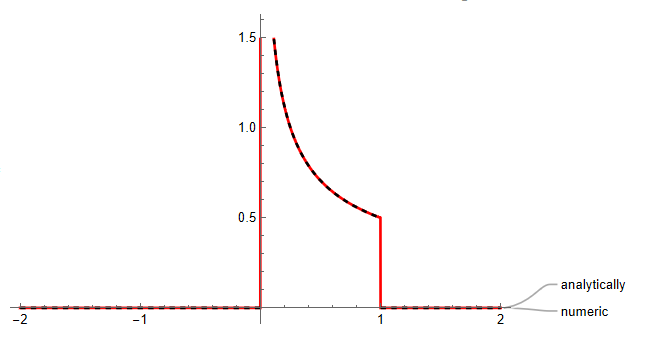On way is:
f[s_] := ArcCoth[Sqrt[s]]/Sqrt[s]
InverseLaplaceTransform[FullSimplify[
InverseMellinTransform[f[s] // TrigToExp, s, w,
GenerateConditions -> False] /. w -> Exp[t],
Assumptions -> t > 0], t, x]
(* HeavisideTheta[1 - x]/(2 Sqrt[x]) *)
Simplify[%, Assumptions -> 0 < x < 1]
(* 1/(2 Sqrt[x]) *)
Another way:
Simplify[InverseMellinTransform[Simplify[
InverseMellinTransform[f[s] // TrigToExp, s, Exp[t],
GenerateConditions -> False], Assumptions -> t > 0], t, Exp[-x],
GenerateConditions -> False], Assumptions -> x > 0]
(* HeavisideTheta[1 - x]/(2 Sqrt[x]) *)
EDITED 12.10.2024
I managed to find the Inverse Stieltjes transform is similar like Hilbert transform:
InverseStieltjesTransform =
1/\[Pi]^2*Integrate[1/(s - x)*f[s], {x, -Infinity, Infinity},
PrincipalValue -> True] ==
Simplify[-1/Pi*
InverseFourierTransform[-I Sign[z] FourierTransform[f[s], s, z,
FourierParameters -> {1, -1}], z, x,
FourierParameters -> {1, -1}], Assumptions -> x > 0] ==
Simplify[
1/Pi*InverseFourierTransform[
I*(2*HeavisideTheta[z] - 1)*
FourierTransform[f[s], s, z, FourierParameters -> {1, -1}], z,
x, FourierParameters -> {1, -1}], Assumptions -> x > 0]
Stieltjes transform of:
$\begin{cases}
\frac{1}{2 \sqrt{x}} & 0<x<1 \\
0 & \text{True}
\end{cases}$ is: $\begin{cases}
\frac{\tanh ^{-1}\left(\frac{1}{\sqrt{s}}\right)}{\sqrt{s}} & \Re(s)\geq 1\lor \Re(s)\leq 0\lor \Im(s)>0\lor \Im(s)<0 \\
\frac{\tanh ^{-1}\left(\sqrt{s}\right)}{\sqrt{s}} & \text{True}
\end{cases}$ NOT $\frac{\coth ^{-1}\left(\sqrt{s}\right)}{\sqrt{s}}$ !
let:
$Version
(*"14.1.0 for Microsoft Windows (64-bit) (July 16, 2024)"*)
func = {Sin[x], Cos[x], Exp[I x], 1/(2 Sqrt[x]), Piecewise[{{1/(2*Sqrt[x]), 0 < x < 1}}, 0]};(*Function examples.*)
A = Integrate[1/(s - x)*(#), {x, -Infinity, Infinity},
PrincipalValue -> True] & /@ func(*Stieltjes Transform*)
A1 = Integrate[1/(s - x)*(#), {x, -Infinity, Infinity},
PrincipalValue -> True, GenerateConditions -> False] & /@
func(*Stieltjes Transform*)
B = 1/\[Pi]^2*Integrate[1/(s - x)*(#), {s, -Infinity, Infinity},
PrincipalValue -> True] & /@ A (*Inverse Stieltjes Transform*)
Simplify[B, Assumptions -> x > 0](*OK, can't calculate *)
B1 = 1/\[Pi]^2*Integrate[1/(s - x)*(#) // Expand, {s, -Infinity, Infinity},
PrincipalValue -> True, Assumptions -> x > 0] & /@ A1[[1 ;; 4]](*OK! Inverse Stieltjes Transform*)
(*{Sin[x], Cos[x], E^(I x), 1/(2 Sqrt[x])}*)
Hard example to invert :
1/\[Pi]^2*Integrate[
1/(s - x)*(-(\[Pi]/(2 Sqrt[-s]))), {s, -Infinity, Infinity},
PrincipalValue -> True,
Assumptions -> x > 0](*Inverse Stieltjes Transform. Ok Works fine*)
1/\[Pi]^2*Integrate[1/(s - x)*(1/
4 (-2 I \[Pi] Sqrt[1/s] - (-2 Log[-(1/s)] +
2 (Log[1/s] + Log[-(1/Sqrt[s])]) + Log[s])/Sqrt[
s])), {s, -Infinity, Infinity}, PrincipalValue -> True,
Assumptions -> x > 0](*Inverse Stieltjes Transform. Ok Works fine*)
1/\[Pi]^2*Integrate[1/(s - x)*(Piecewise[{{ArcTanh[1/Sqrt[s]]/Sqrt[s],
Re[s] >= 1 || Re[s] <= 0 || Im[s] > 0 || Im[s] < 0}},
ArcTanh[Sqrt[s]]/Sqrt[s]]), {s, -Infinity, Infinity},
PrincipalValue -> True,
Assumptions ->
x > 0](*Inverse Stieltjes Transform.I Aborted to long time to compute!*)
1/\[Pi]^2*Integrate[1/(s - x)*((2 ArcCoth[Sqrt[s]] + Log[-(1/s)] - Log[1/s])/(
2 Sqrt[s])), {s, -Infinity, Infinity}, PrincipalValue -> True,
Assumptions ->
x > 0](*Inverse Stieltjes Transform.I Aborted to long time to compute!*)
Simplify[-1/Pi*InverseFourierTransform[-I Sign[z] *FourierTransform[
Piecewise[{{ArcTanh[1/Sqrt[s]]/Sqrt[s],
Re[s] >= 1 || Re[s] <= 0 || Im[s] > 0 || Im[s] < 0}},
ArcTanh[Sqrt[s]]/Sqrt[s]], s, z, FourierParameters -> {1,-1}],
z, x, FourierParameters -> {1, -1}],
Assumptions ->
x > 0](*Inverse Stieltjes Transform.I Aborted to long time to compute!*)
Workaround for one hard example,I use a Trick:
$$\frac{\int_{-\infty }^{\infty } \frac{
\begin{array}{cc}
\{ &
\begin{array}{cc}
\frac{\tanh ^{-1}\left(\sqrt{s}\right)}{\sqrt{s}} & \Re(s)\geq 1\lor \Re(s)\leq 0\lor \Im(s)>0\lor \Im(s)<0 \\
\frac{\tanh ^{-1}\left(\sqrt{s}\right)}{\sqrt{s}} & \text{True} \\
\end{array}
\\
\end{array}
}{s-x} \, ds}{\pi ^2}=\int_0^1 \frac{\int_{-\infty }^{\infty } \frac{\frac{\partial }{\partial Q}\left(
\begin{array}{cc}
\{ &
\begin{array}{cc}
\frac{\tanh ^{-1}\left(\frac{Q}{\sqrt{s}}\right)}{\sqrt{s}} & \Re(s)\geq 1\lor \Re(s)\leq 0\lor \Im(s)>0\lor \Im(s)<0 \\
\frac{\tanh ^{-1}\left(Q \sqrt{s}\right)}{\sqrt{s}} & \text{True} \\
\end{array}
\\
\end{array}
\right)}{s-x} \, ds}{\pi ^2} \, dQ$$
L = Assuming[x \[Element] Reals, 1/\[Pi]^2*
Integrate[
1/(s - x)*(D[
Piecewise[{{ArcTanh[Q/Sqrt[s]]/Sqrt[s],
Re[s] >= 1 || Re[s] <= 0 || Im[s] > 0 || Im[s] < 0}},
ArcTanh[Q*Sqrt[s]]/Sqrt[s]], Q]), {s, -Infinity, Infinity},
PrincipalValue -> True]]
L1 = FullSimplify[L, Assumptions -> {0 < Q < 1, x \[Element] Reals}]
Integrate[L1, {Q, 0, 1}, Assumptions -> x \[Element] Reals]
(*To long time to compute !!!*)
we compute numerically:
R[x_] := NIntegrate[
Piecewise[{{Log[-(((-1 + Q^2)*x)/(-1 + x))]/(-1 + Q^2*x) -
Log[-(((-1 + Q^2)*x)/(Q^2*(-1 + x)))]/(Q^2 - x),
x > 1}, {((-I)*Pi + Log[((-1 + Q^2)*x)/(-1 + x)])/(-1 + Q^2*x) -
Log[-(((-1 + Q^2)*x)/(Q^2*(-1 + x)))]/(Q^2 - x), x <= 0}},
Log[((-1 + Q^2)*x)/(-1 + x)]/(-1 + Q^2*x) -
Log[((-1 + Q^2)*x)/(Q^2*(-1 + x))]/(Q^2 - x)]/Pi^2, {Q, 0, 1}];
Plot[{R[x], Piecewise[{{1/(2*Sqrt[x]), 0 < x < 1}}, 0]}, {x, 0, 2},
PlotStyle -> {Red, {Dashed, Black}},PlotLabels -> {"numeric", "analytically"}]

Computing Inverse Stieltjes transform numerically:
N[Piecewise[{{1/(2*Sqrt[x]), 0 < x < 1}}, 0] /. x -> 1/2, 20]
(* 0.70710678118654752440 *)
g[s_]:=(Piecewise[{{ArcTanh[1/Sqrt[s]]/Sqrt[s],
Re[s] >= 1 || Re[s] <= 0 || Im[s] > 0 || Im[s] < 0}},
ArcTanh[Sqrt[s]]/Sqrt[s]])
1/\[Pi]^2*NIntegrate[1/(s - x)*g[s] /. x -> 1/2, {s, -Infinity, 1/2,
Infinity}, Method -> "PrincipalValue", WorkingPrecision -> 20]
(*0.70710678118654752494*)
Another example:
X = LaplaceTransform[MomentGeneratingFunction[NormalDistribution[\[Mu], \[Sigma]], t], t, s]
X1 = X /. \[Mu] -> 1/2 /. \[Sigma] -> 1/3
1/\[Pi]^2*NIntegrate[1/(s - x)*X1 /. x -> 1, {s, -Infinity, 1, Infinity},
Method -> "PrincipalValue", WorkingPrecision -> 20]
(* 0.38855278699767518268 + 0.71823717421850285373 I *)
(*and here's the puzzle, I don't know why I have to take the real part *)
Re[%]
(* 0.38855278699767518268 *)
N[PDF[NormalDistribution[\[Mu], \[Sigma]], x] /. \[Mu] ->
1/2 /. \[Sigma] -> 1/3 /. x -> 1, 20]
(*0.38855278699767518284*)
EDITED 13.10.2024
If we don't use the principal-value integral can be written explicitly:
B = {-\[Pi] Cos[s], \[Pi] Sin[s], -I E^(I s) \[Pi], -(\[Pi]/(2 Sqrt[-s]))};
g[s_] = B[[n]] // Quiet
Table[-(2/Pi^2)*Limit[Integrate[(g[x - s] - g[x + s])/(2 s), {s, eps, Infinity},
Assumptions -> {eps > 0, x > 0}, GenerateConditions -> False],
eps -> 0, Assumptions -> x > 0, Direction -> -1], {n, 1, 4}](*Inverse Stieltjes Transform*)
{Sin[x], Cos[x], E^(I x), 1/(2 Sqrt[x])}

